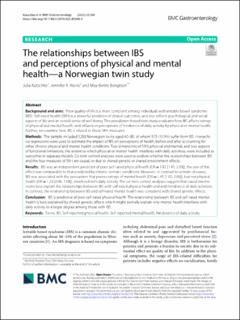| dc.description.abstract | Background and aims: Poor quality of life is a main complaint among individuals with irritable bowel syndrome (IBS). Self-rated health (SRH) is a powerful predictor of clinical outcomes, and also reflects psychological and social aspects of life and an overall sense of well-being. This population-based twin study evaluates how IBS affects ratings of physical and mental health, and influences perceptions of hindrance of daily activity by physical or mental health. Further, we examine how IBS is related to these SRH measures. Methods: The sample included 5288 Norwegian twins aged 40-80, of whom 575 (10.9%) suffer from IBS. Hierarchical regressions were used to estimate the impact of IBS on perceptions of health, before and after accounting for other chronic physical and mental health conditions. Two dimensions of SRH, physical and mental, and two aspects of functional limitations, the extent to which physical or mental health interferes with daily activities, were included as outcomes in separate models. Co-twin control analyses were used to explore whether the relationships between IBS and the four measures of SRH are causal, or due to shared genetic or shared environment effects. Results: IBS was an independent predictor of poor self-rated physical health (OR = 1.82 [1.41; 2.33]), the size of this effect was comparable to that predicted by chronic somatic conditions. However, in contrast to somatic diseases, IBS was associated with the perception that poorer ratings of mental health (OR = 1.45 [1.02; 2.06]), but not physical health (OR = 1.23 [0.96; 1.58]), interfered with daily activity. The co-twin control analyses suggest that causal mechanisms best explain the relationships between IBS with self-rated physical health and with hindrance of daily activities. In contrast, the relationship between IBS and self-rated mental health was consistent with shared genetic effects. Conclusion: IBS is predictive of poor self-rated physical health. The relationship between IBS and self-rated mental health is best explained by shared genetic effects which might partially explain why mental health interferes with daily activity to a larger degree among those with IBS. | |
